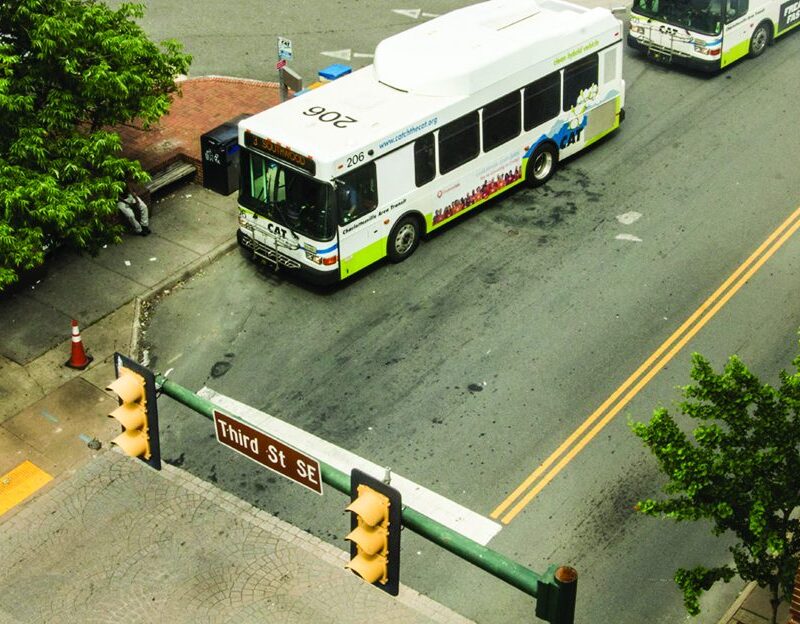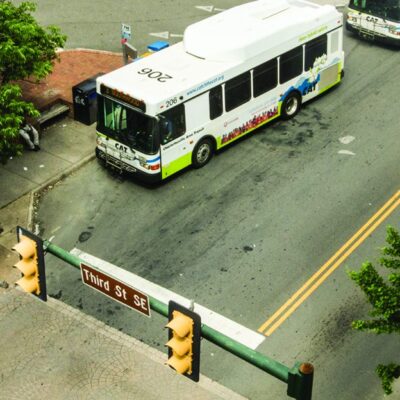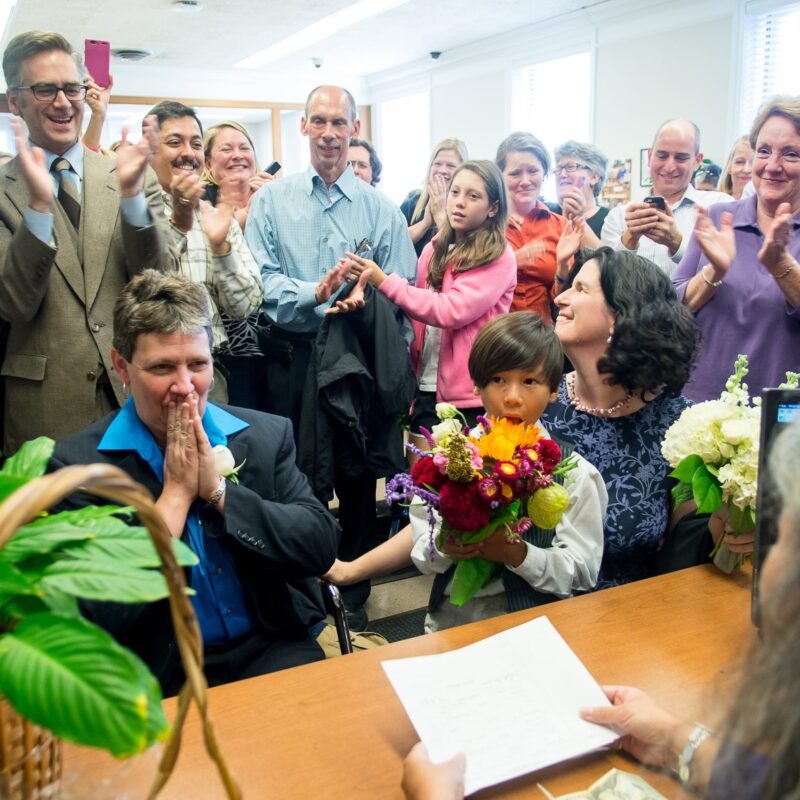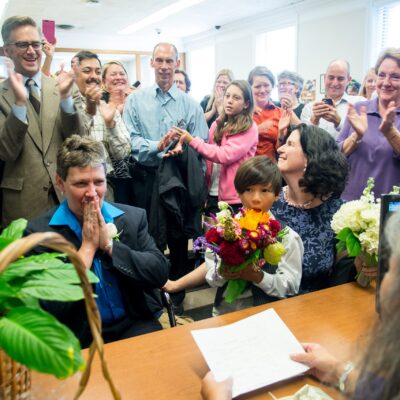In its second round as an elected office, the city School Board race seems to be garnering even less discussion than it did in May 2006. City residents voted in 2005 to change what was a City Council appointment system to an elected one. That change was largely the fall-out of the Superintendent Scottie Griffin fiasco, which resulted in a contract buy-out after less than a year on the job and brought heaps of criticism on the then School Board. It took more than a year to fill the seat with the current superintendent, Rosa Atkins, but while the public outcry has cooled off, the city school system still faces a declining enrollment and a performance gap between students who are wealthy and white and those who are poor and black.
Four seats are up on the Board, and only one incumbent is running, Chair Alvin Edwards, a pastor at Mt. Zion First African Baptist Church. Those looking to replace Julie Gronlund, Charlie Kollmansperger and Peggy Van Yahres include a seventh grade math teacher, Colette Blount; a cartoonist, W. Grant Brownrigg; a public defender, Llezelle Dugger; an architect, Kathleen Galvin; an IT specialist at UVA, Sean McCord; and an artist, Lynette Meynig. We gave each candidate about 30 words to answer each question. Here’s what they had to say.
What you would fight hardest to fix within your four-year term:
Colette Blount: I will work to broaden enrichment opportunities (e.g., foreign languages) in our elementary schools; maintain a highly diverse teaching force; and fortify communication between our schools and our community.
W. Grant Brownrigg: I want to do more for teachers—more compensation, recognition, and involvement in decisions. Therefore, I’d work for more business support and a culture of lean management and continuous improvement.
Llezelle Dugger: I want to reduce our dropout rate and increase our graduation rate.
Alvin Edwards: I would fix technology, which will provide the answer to many of the issues that are related to student achievement. It has student involvement, staff involvement and it calls for community involvement ( i.e., business).
Kathleen Galvin: Priority: address stress points in the system. The Board needs to look carefully at teacher morale and elicit their feedback on instruction, curriculum, school structure, classroom management and student/teacher relationships.
Sean McCord: Develop creative funding approaches; strengthen relationships with community partners; assure an open environment where families and students always feel welcome; promote frank and open discussions about school and community problems.
Lynette Meynig: Figuring out what makes school fun and a place of learning for those that dislike school. Let me see, I figure that’s the majority who’d rather be elsewhere than in school.
What you would fight hardest to keep that the school system is currently doing:
Colette Blount: Our vibrant music/fine arts programs must continue. These outlets provide children growth through exploration. Our per-pupil expenditure demonstrates commitment to students. Maintaining this will allow for future incorporation of innovative programs.
W. Grant Brownrigg: I want to keep the school’s focus on its bottom line—quality education for all children —and its following of a detailed strategic plan to accomplish this.
Llezelle Dugger: Our system continues to strengthen its ties to all parents/guardians and the community at large. Only with this type of collaboration can we better serve each of our children.
Alvin Edwards: I would fight hardest to keep the Board and administration focused on implementing the Strategic Plan. Because of that plan, the system is headed in a direction that we are concerned about the student achievement.
Kathleen Galvin: Priority: identify and reinforce strengths. Preschool and instrumental-music instruction programs pay huge dividends. Expand preschool to include 3-year-olds and the entire city. Reinforce elementary musicianship programs, provide mentorship.
Sean McCord: Continue to find solutions for closing the achievement gaps; follow the Strategic Plan developed by the administration; strengthen policies to attract and retain our quality teachers.
Lynette Meynig: Encouraging the kids to believe that they are smart, they can, and they are successful. There’s a handful of teachers most of the kids respond excellently to. Embrace that.
In general, does the city school system need a major overhaul or just minor tweaking in order to meet the needs of city students?
Colette Blount: The scholastic and artistic successes of many CCS students indicate program strengths. Disparities in achievement and access to enrichment activities by many students warrant an in-depth analysis.
Llezelle Dugger: Somewhere in between. Regardless of SOLs and AYPs, each child learns differently and "teaching to the test" does not serve students’ needs. We need to teach each individual child.
W. Grant Brownrigg: Under the new superintendent, the school had started fixing the damage and turning around. It now can concentrate on fulfilling its mission, which will require a lot of work.
Alvin Edwards: It is focused on student achievement and as with any plan, will need to be modified as related to issues and concerns that arise. Two of the most important issues facing the School Board are how we respond to preparing students for the 21st century and having the infrastructure for technology.
Kathleen Galvin: Neither. Go beyond AYP as the measure of success and reorient our priorities. Increase achievement by first addressing the whole child, engaging family and community, and providing effective learning environments.
Sean McCord: The schools have functioned well under Superintendent Atkins. However, as Charlottesville’s first fully elected school board, it will be our responsibility to examine every aspect to ensure the best system possible.
Lynette Meynig: Major overhaul. The SOLs, No Child Left Behind is bogus. The paradigm is wan
ting to shift. We all feel it. We must focus on the positive, let the children guide us as to what they need.
How do you describe yourself as a student when you were in high school?
Colette Blount: "Swimming against the tide" was how I applied a metaphor in a high school entrance exam essay. I responded to that challenge with creativity and courage. My response to challenge remains steadfast.
W. Grant Brownrigg: I worked extremely hard and did well in a demanding school. I ran varsity cross country from my sophomore year on and had a part-time job all four years.
Llezelle Dugger: Boy crazy! My parents sent me to an all girls high school!
Alvin Edwards: I was much like many of the high schoolers today. I had short vision and I wasn’t sure of what I wanted to do. After I graduated, I did not want to go to college—I wanted a job and a car.
Kathleen Galvin: I enrolled in a voluntary, multidisciplinary, multiyear course that investigated urban and rural environments. We did research, taught, advocated and assumed leadership. This was in addition to the college preparatory curriculum.
Sean McCord: I could have been an honor student had I tried harder.
Lynette Meynig: I was a good student that played the game, disliked school because I felt stupid, unappreciated, unheard, unseen and geeky. I was a different, creative, out-of-the-box thinker and didn’t fit in.





